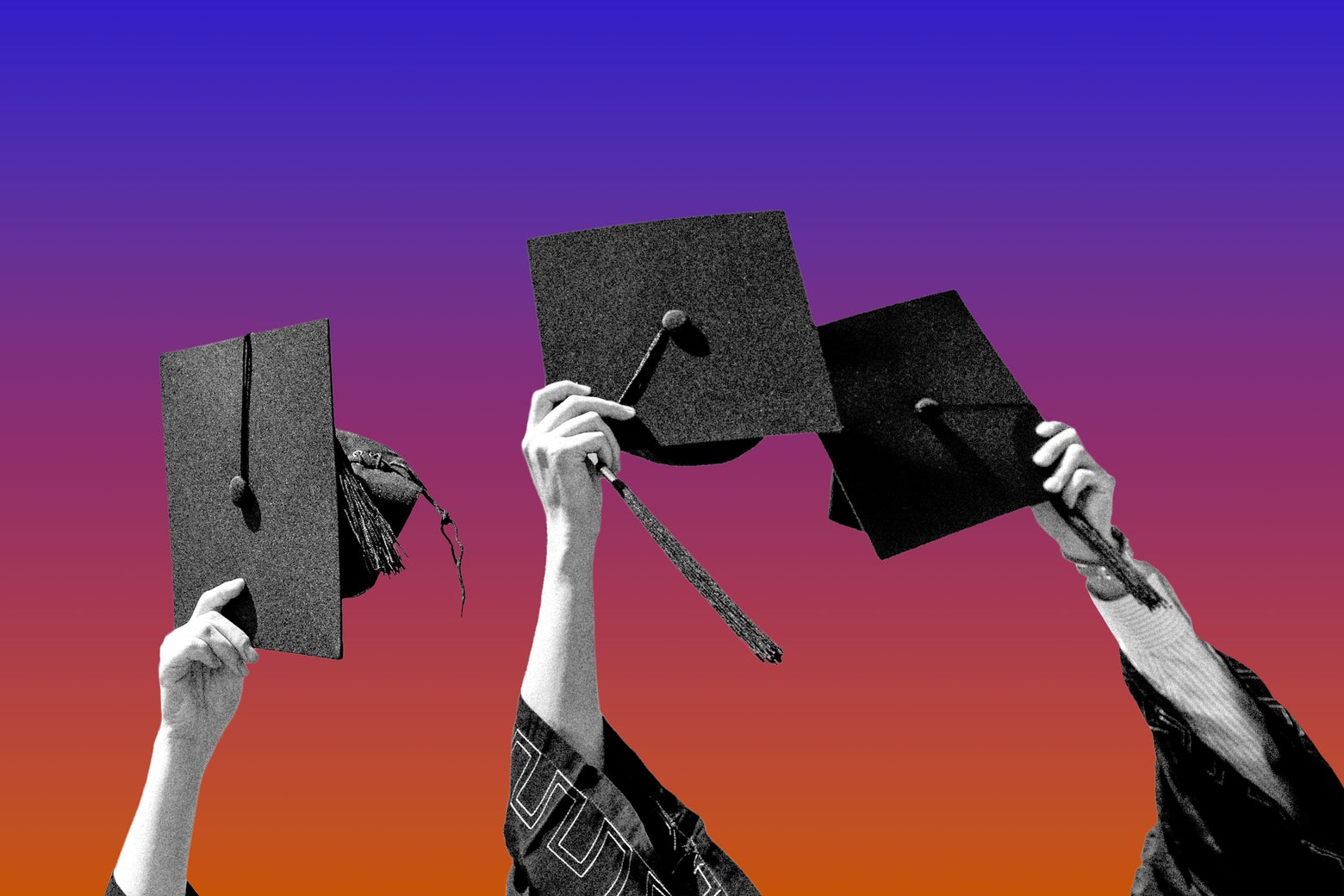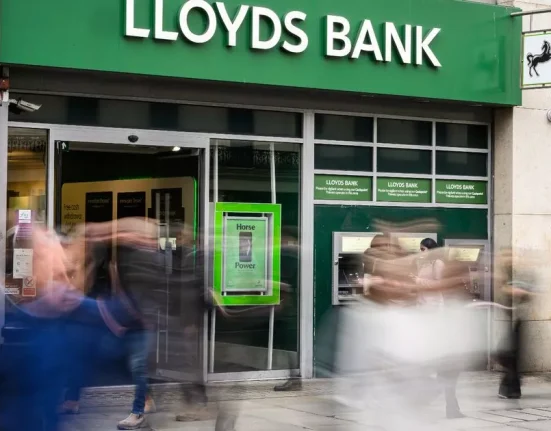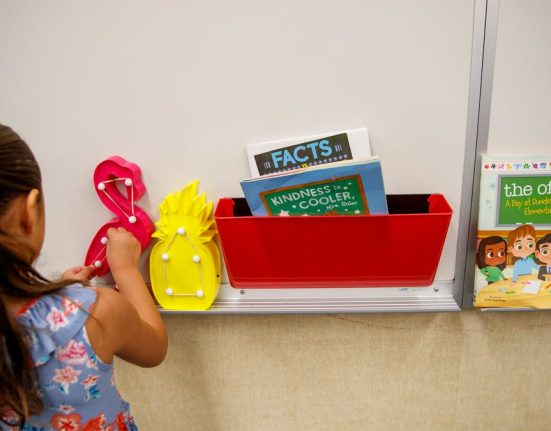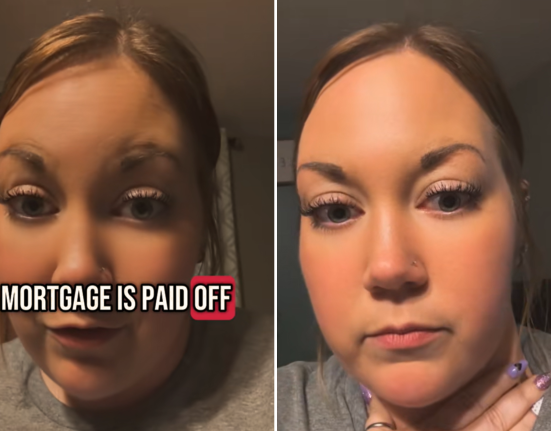Sign up for the Slatest to get the most insightful analysis, criticism, and advice out there, delivered to your inbox daily.
The Department of Education provides money to local school districts. It spends billions of dollars on special education. But more than anything else? It operates like a bank. More than 40 million Americans are customers of the DOE’s “bank,” and they’re wondering how their repayment plans will be affected by President Donald Trump’s efforts to eliminate the department.
Joe Biden had attempted to lower student-loan repayments in several ways, but what he was trying got caught up in court. That allowed the Trump administration to make different kinds of decisions. And after last week’s executive order dismantling the department, the president announced that the DOE won’t even oversee student loans anymore.
On a recent episode of What Next, host Mary Harris talked to Washington Post higher-education reporter Danielle Douglas-Gabriel about what’s happening with student loans, how it has affected borrowers, and what people should consider when taking out loans going forward. This transcript has been edited and condensed for clarity.
Mary Harris: What’s actually happening on the ground?
Danielle Douglas-Gabriel: So the SAVE Plan has created this cascading effect throughout the entire federal student-loan system. Because of the way the courts viewed this particular case, they created questions about whether student-loan forgiveness was legal at all under the statute that SAVE was created through. And that statute created other income-driven repayment plans.
If you are someone who has borrowed, say, $50,000 or $60,000 and really can’t afford to pay that amount back on a standard 10-year plan, then these income-driven repayment plans offer you a lower monthly payment because it’s based on your disposable income, so a percentage of your earnings. Right now you can’t access those programs because the department is not allowing student-loan servicers to process any of those applications. Borrowers I’ve spoken to in the past couple of months are just kind of worried.
At the same time that this income-based repayment situation is happening, folks who used to be eligible for loan forgiveness, they’re having trouble accessing that, right?
There are two things happening. A lot of the federal workers who have been laid off or fired as a result of the activities of DOGE are losing access to the public-service jobs that would qualify them for public-services loan forgiveness. Now, it’s entirely possible those people are going to find jobs in state governments or other agencies or other qualifying nonprofits and they’ll be fine. But given the flood of people that are now looking for employment, it will probably be difficult.
On the other side, a few weeks ago, the Trump administration said that it wants to limit eligibility for public-service loan forgiveness and strip it away from certain nonprofit groups. This is something that cannot easily be done, but there are a lot of public servants who aren’t even touched by that, who are just still generally really anxious because of the uncertainty.
I’m getting the sense that so much of what’s being proposed here, when it comes to student loans, is going to take a long time to sort out. Some of it may not be legal, but the overall impact is a ton of anxiety and fear. Is there anything people who are worried about their student loans can do?
There are things you can do to at least shore up your end of what’s happening. One, go on studentaid.gov and download all your files, so that you can have a paper trail of all your payments. If you are somebody who may qualify for public-service loan forgiveness right now, submit that certification form from your employer saying that Yes, I work for someone who qualifies as an employer under this program. Make the effort to do that right now.
In case we get to a point where there is an effort to really change this program, you can say, Hey, I qualified at this stage. And perhaps that gives you stronger legal ground to make sure that you can get student-loan forgiveness.
Is there any argument that the things that are happening now at the Department of Education around student loans could be beneficial long term?
None that come to mind. The student-loan program was created to afford more access to a college education for people who don’t readily have the money to pay for it.
Perhaps, and this is debatable, there is an overreliance on debt financing for college and states and schools should just step up and do more to make sure that students don’t have to borrow. And you have seen a fairly consistent trend, over the past decade or so, of states and schools starting to step up in terms of institutional grants and scholarships. And as a result, you actually have seen less undergraduate borrowing. So something is working on that end.
Student loans still can be a very useful part of being able to pay for college, if done strategically. Things like Don’t borrow more than you expect to make your first year out of college—those sorts of rules tend to help folks to stay in a space where they can afford to pay back their debt. But the reality is, the system does need some significant changes and overhauls to ensure that people aren’t saddled with debt that’s unpayable.
Are there working theories about an end goal here for the Trump administration?
The president was far clearer in his vision the first term that the federal government should play far less of a role in education lending and it should go back to private lenders who used to play a much larger role in education financing. We haven’t heard that explicitly from him this time around, but certainly the actions not just from him, but from the Republican Party broadly, suggest that that is the ultimate goal.
I’m a parent of an older teenager who might be thinking about college next year. And I’m curious what you would tell someone like me, because we’ve saved a little bit, but we’re certainly gonna be looking at loans.
For all of the people who are having challenges, there are a lot of people who were just paying their loans. It’s autodebited right out of their account. There is that population of borrowers for whom the federal student-loan program has worked the way it was intended: They got their education and they’re thriving. I don’t want to discount that.
At the same time, I think families are becoming a lot more savvy about this big, massive financial decision.
We now live in a time when there are 30 states that have some form of tuition-free college, often at the community-college level and in some cases also at the four-year-college level. That shouldn’t be discounted as people are making the decision about where to go.
And again, student loans are not a bad thing. Used wisely, they can be a great way to obtain your education. And that hasn’t changed, necessarily. It’s just that the past five to 10 years have shown us the need to be strategic with the use of these student loans and to be really thoughtful about it.
Go into this decision with the same kind of bright-eyed, inquisitive mind that you would if you were buying a house or buying a car. Sometimes, people lead with the emotional side of a college education, and that’s great, but it is still a financial decision and has to be treated as such.
Do you think there’s gonna be a moment when people who hold these loans, who may be feeling jerked around a little bit, are going to get mad?
Oh, they already have been mad. That anger is there, and has been there for a while. I think we certainly saw flashes of it during the debates and fights over Biden’s plan to offer sweeping debt cancellation. Students were out in the street, protesting to ensure that this happened, and were completely angry when it did not.
I don’t believe that’s going away. What will be interesting is to see how that evolves or changes because of what’s happening with the Department of Education, with the future of student loans, all of those things. I haven’t seen any flashes of protest yet around that, but I wouldn’t be surprised if we were to see that soon.








